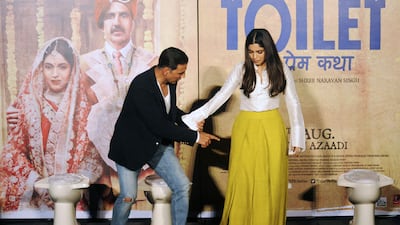Akshay Kumar and director Shree Narayan Singh seem to have done the impossible with Toilet: Ek Prem Katha (Toilet: A Love Story). They present an urgent social issue disguised in the colourful trappings of a conventional Bollywood movie – and it works. The film, which focuses on the lack of lavatories in rural India and the dangers, especially to women, of going in the open, cleverly channels all the usual Hindi cinema tropes – song, dance, action, melodrama. It is admittedly a simplistic telling, but then, if the film is meant to spread awareness among the rural poor, such a guileless, transparent narrative is essential.
Keshav (Kumar) is a middle-aged man living in Mandigaon, a small village in Uttar Pradesh. After a brief romance with Jaya (Bhumi Pednekar), a fiery, emancipated young woman, he weds her and takes her home. But the very next morning all hell breaks loose – Jaya finds out that the house doesn't have a toilet. Forced to wake up before dawn and trudge to a distant field under cover of the dark sky, huddling with other village women for safety, the outraged Jaya causes an unprecedented upheaval of the general order with her demand for a private toilet. It threatens her marriage, exposes outdated traditions, and puts pressure on the government to deliver on its promise of Swachh Bharat (Clean India), prime minister Narendra Modi's top-billed social campaign.
Pednekar is luminous as the young new home-maker whose orthodox father-in-law expects servility and unquestioned obedience. Frustrated by his outright refusal to build a toilet – in keeping with ancient Hindu customs that require lavatories to be as far away from the angan (courtyard) as possible – Jaya heads to her parents' house, determined to return to her husband only after her demand is met. But when news of her mutiny goes national, she slowly comes to the realisation that her quest cannot just be for her own betterment, but for thousands of girls and women all over India caught up in the same struggle.
In an honest look at how villages see sanitary facilities as unwelcome strides towards modernity, Toilet: Ek Prem Katha accurately depicts the apathy of village panchayats (committees) and elders to the daily dangers their womenfolk face. It makes for chilling viewing, especially as the film also makes reference to the 2014 incident in Uttar Pradesh's Katra Sahadatganj village, where two teenage girls were raped and lynched after they stepped out late one night to relieve themselves.
Kumar is magnificent as Keshav, a man who unabashedly supports his wife's cause and, in doing so, unwittingly spearheads a revolution. He is an ordinary guy trapped between his domineering father, miserable partner and the hostility of an entire village. His only help is his brother, Naru (portrayed by the delightful Divyendu Sharma, who takes comedy to a whole new level). While Keshav's fight to construct a private toilet in his home, and a public one for Mandigaon, feels like a propaganda vehicle for Modi's Swachh Bharat, the film neatly exposes a cross-section of the deep-rooted problems hindering progress: the unflinching belief in certain cultural practices that smack of misogyny; the lack of water in some parts of the country; and the gargantuan task of educating the rural population about the importance of hygiene: according to a study by the United Nations, one billion people worldwide still practice open defecation. Of those, 600 million are in India.
A recent survey commissioned by the Indian government shows that, thanks to a subsidy-based programme for the mass construction of toilets, 62.5 per cent of rural households now have lavatories, a sharp increase from 39 per cent in 2014. But there's a long way to go. According to The Hindu newspaper, a further 60 million are required. And while Toilet: Ek Prem Katha only shines a light on the issue plaguing India's villages, this is the tip of the iceberg – urban areas still do not have a cohesive waste management plan, with nearly 60 per cent of city sewage directed into rivers, streams and the ocean.
Because the film is nearly three hours long, the plot winds its way to a rather predictable conclusion. But thanks to strong performances by its entire cast (grand dame Shobha Khote is unforgettable as Keshav's imperious grandmother), it manages to accomplish what it sets out to do: a push for Modi's vision of "Clean India", and the welfare of women. One thing stands out: Keshav's insistence that the issue is not about "shauchalaya" [toilet] but "soch" [thinking]: what is needed is an effort to educate those bound to their customs; those for whom open defecation remains a way of life, even as dozens of government-built lavatories stay unused and fall to ruin.
__________________________
Read more:
Shah Rukh Khan reflects on his career: 'My dreams were very small'
Film review: The fine ensemble drama Mamno’ El Eqterab Aw El Tasweer raises some pertinent topics
Bollywood stars who consider the UAE home
__________________________

